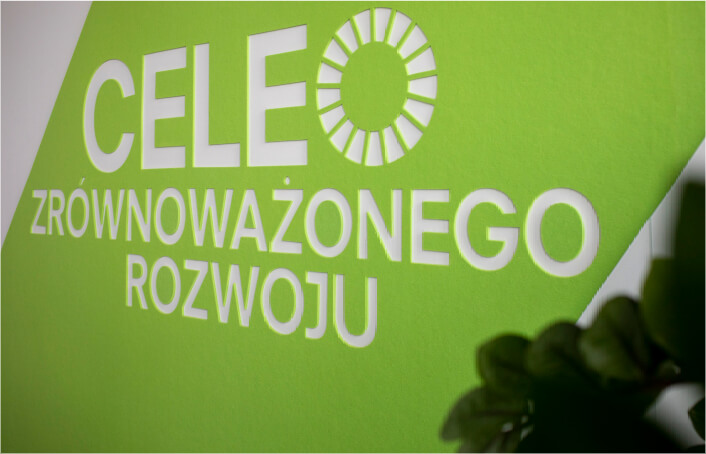ESG MANAGEMENT
Irina Oleś
Audit Manager
ESG in the Bank’s strategy
BNP Paribas Bank Polska is an organisation aware of its impact on its environment and approaches the management of ESG (E-environment, S-social, G-governance) aspects in a responsible and comprehensive manner. Maintaining its position as a leader in sustainable finance is one of the Bank’s key commitments under the GObeyond strategy for 2022-2025, and the issues of changing environmental, social and corporate governance concerns are an integral part of it.
Overseeing the implementation of strategic objectives from the area of sustainable development is the Executive Director of the Sustainability Area, Chief Sustainability Officer (CSO), reporting directly to the CEO.
Sustainable financing
The role of responsible financial institutions is to develop products and services with a positive impact, responding to global challenges and local market conditions, and to limit financing that is not in line with this direction. The Bank’s sustainable product offering supports environmentally and socially responsible investments or activities and contributes to the Sustainable Development Goals (SDGs).

Value of sustainable financing granted in 2023
| Value of sustainable financing |
Value (PLN million) |
||
|---|---|---|---|
| 31.12.2023 | 31.12.2022 | change y/y % | |
| with a positive environmental impact | 6,553 | 5,839 | 12.2% |
| with a positive social impact | 565 | 341 | 65.7% |
| ESG Rating-Linked Loan | 340 | –1 | – |
| Sustainability-Linked Loan | 2,141 | 343 | 524.2% |
| TOTAL | 9,599 | 6,523 | 47.2% |
- The ESG Rating-Linked Loan was introduced to the Bank’s product offer in December 2022
| Financing with a positive environmental impact |
Value (PLN million) |
||
|---|---|---|---|
| 31.12.2023 | 31.12.2022 | change y/y % | |
| renewable energy | 1,870 | 1,440 | 29.9% |
| ecological construction | 2,441 | 2,209 | 10.5% |
| thermal modernisation of buildings | 1,322 | 1,447 | (8.6%) |
| improving the energy efficiency of production processes | 130 | 154 | (15.6%) |
| low-emission transport | 225 | 394 | (42.9%) |
| circular economy | 251 | 24 | 945.8% |
| sewage and water treatment* | 95 | 232 | 313.0% |
| natural resources and biodiversity | 219 | 148 | 48.0% |
| TOTAL | 6,553 | 5,839 | 12.2% |
- In the categories of financing with a positive environmental impact, an additional category ‘waste and water treatment’ was included. As a result of the change, it was also necessary to update the sustainable financing values for 2022.
| Financing with a positive social impact |
Value (PLN million) |
||
|---|---|---|---|
| 31.12.2023 | 31.12.2022 | change y/y % | |
| counteracting social exclusion | 2 | 13 | 100% |
| healthcare | 416 | 306 | 35.9% |
| education | 121 | 30 | 303.3% |
| basic infrastructure (e.g. water supply, sewage) | 26 | 4 | 550.0% |
| TOTAL | 565 | 341 | 66.2% |
- In the categories of financing with a positive social impact, an additional category ‘counteracting social exclusion’ was included. As a result of the change, it was also necessary to update the sustainable financing values for 2022.

Responsibility towards the natural environment is one of the Bank’s commitments under the POSITIVE pillar of the GObeyond strategy. For many years, we have been involved in counteracting climate change and minimising its effects. The Bank of Green Changes programme aggregates all of the organisation’s initiatives for the natural environment.
The Bank of Green Changes programme includes:
- monitoring Clients and investments from an ESG perspective and implementing CSR policies, with a particular focus on decarbonisation processes,
- continuous development of the range of products and services that support our Clients in the transition to a low-carbon economy and green investments,
- qualitative changes in the way the organisation operates (known as eco-improvements) to minimise the negative impact of its operations on the natural environment,
- educating employees from all parts of the Bank and external stakeholders, building partnerships and supporting pro-environmental initiatives.
-
Hybrid and electric cars in the fleet
-
606
2022
-
823
2023
-
-
Electricity utilised by the Bank from renewable sources
-
100 %
2022
-
100 %
2023
-
Selected environmental indicators
| 2021 | 2022 | 2023 | Change 2023/2023 | ||
|---|---|---|---|---|---|
|
|
Number of photovoltaic installations financed for individual customers (thousand) | 16,065 | 6,413 | 6,251 | (2.5%)1 |
| Group greenhouse gas emissions generated from operations | 10,792 | 11,539 | 10,144 | (12.1%) | |
| Hybrid and electric cars in the fleet | 376 | 606 | 823 | 35.8% | |
| Electricity utilised by the Bank from renewable sources | 100% | 100% | 100% | no change | |
- A decrease is due to an apparent lower propensity to take out loans for PV installations with the change in billing rules introduced on 1.04.2022.
At the Bank, we actively contribute to society – our employees, customers and local communities. We are committed to ensuring that all employees feel valued and have the same opportunity for personal development. Communication with our employees is based on honesty, respect and acting in accordance with ethical standards. It is also about promoting and reinforcing the values we live by every day.
In addition, we constantly strive to make our products and services more accessible to vulnerable groups. We are open to the needs of our Clients. We promote philanthropic projects for social equality. We take initiatives for the benefit of local communities. We develop our initiatives above all where we can make a real contribution to positive change.
-
Number of training hours – average per person employed by the Bank in a given year
-
28.9
2022
-
26.3
2023
-
-
Number of Clients’ centres with the “Barrier-free Facility” certificate
-
103
2022
-
131
2023
-
Selected social indicators
Bank data, unless otherwise indicated.
| 2021 | 2022 | 2023 | Change 2023/2023 | ||
|---|---|---|---|---|---|
|
|
The Bank’s headcount (number of employees) | 8,809 | 8,392 | 8,052 | (4.1%)2 |
| The Group’s headcount (number of employees) | 9,035 | 8,585 | 8,204 | (4.4%) | |
| Number of training hours – average per person employed by the Bank in a given year | 24.32 | 28.99 | 26.3 | (9.3%) | |
| Gender Pay Gap | 7.32% | 6.51% | 6.24% | (0.27 p.p.)3 | |
| Percentage of women in managerial positions in a given year | 56% | 53% | n/d | not applicable | |
| Percentage of women in top management (B1+B2) in the Bank and the Group | – | – | 46% | not applicable3 | |
|
|
Number of the Bank’s volunteers involved in the Noble Gift campaign in the given year | 2,610 | 3,028 | 2,223 | (26.6%) |
| Amount of donations made under the Local Grant Programme in a given year | 300,000 | 300,000 | 300,000 | no change | |
| Total number of Local Ambassadors of the Bank operating throughout Poland | 100 | 132 | 140 | 6.1% | |
| Kilometers achieved through the Good Kilometers campaign in a given year | 71,952 | 75,474 | 159,230 | 111% | |
| Total number of regular donors under the Support All Year programme | 260 | 345 | 397 | 15.1% | |
| Number of scholarship recipients of the “Class” programme in a given year | 83 | 95 | 95 | no change | |
| Number of Clients’ centers with the “Barrier-free Facility” certificate | 77 | 103 | 131 | 27.2% | |
- In light of the need to adapt the Bank’s business model to the changing business environment, a collective redundancy programme for 2021-2023 was announced in December 2020 in consultation with the trade unions. In addition, in order to mitigate the social impact of the collective redundancies, the Bank agreed with the trade unions to pay additional compensation and other elements of social protection, in addition to the statutory severance payments due to the redundant employees, and launched a Voluntary Redundancy Programme. In 2023, the Collective Redundancy Programme and the Voluntary Redundancy Programme continued.
- As a result of the reassignment of the number of employees to the structure by Board of Directors, Top Management (B1 + B2), Lower Management, Other Employees, the approach to the presentation of the indicator on the percentage of women in management positions was changed.
Responsible corporate governance is the foundation of all our activities. We implement the best market practices in this regard and adhere to the highest standards of ethics and responsibility. A key document from the perspective of ESG management at the Bank is the BNP Paribas Code of Conduct. The Bank is also one of the initiators of The Declaration of Responsible Selling, which aims to raise and disseminate ethical standards in customer relations, educate business and consumers, increase trust in the financial industry and counteract unfair practices.
As a responsible financial institution, the Bank monitors the level of ESG risks of all its business customers. We also pay particular attention to the financing of sectors considered sensitive in terms of ESG risks.
-
Value of sustainable financing (PLN billion)
-
6.5
2022
-
9.6
2023
-
-
Number of CSR Analyses carried out during the year
-
207
2022
-
273
2023
-
Selected economic indicators
| 2021 | 2022 | 2023 | Change 2023/2023 | ||
|---|---|---|---|---|---|
|
|
Number of CSR Analyses carried out during the year | 174 | 207 | 273 | 31.9% |
| Value of sustainable financing (in PLN billion) | 3,9 | 6,5 | 9,6 | 47.7% | |
| CSR declarations signed by our new suppliers during the year | 43 | 27 | 211 | 681.5%4 | |
| Percentage of expenditure on products and services accounted for by purchases from local suppliers in a given year | 85% | 85% | 85% | – | |
- The increase in the number of signed declarations is a result of a larger pool of suppliers being included in the cyclical assessment under the BNP Paribas Group’s new methodology.
